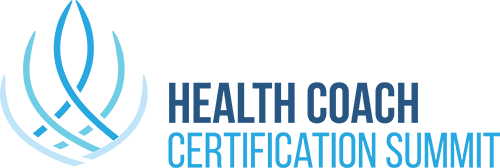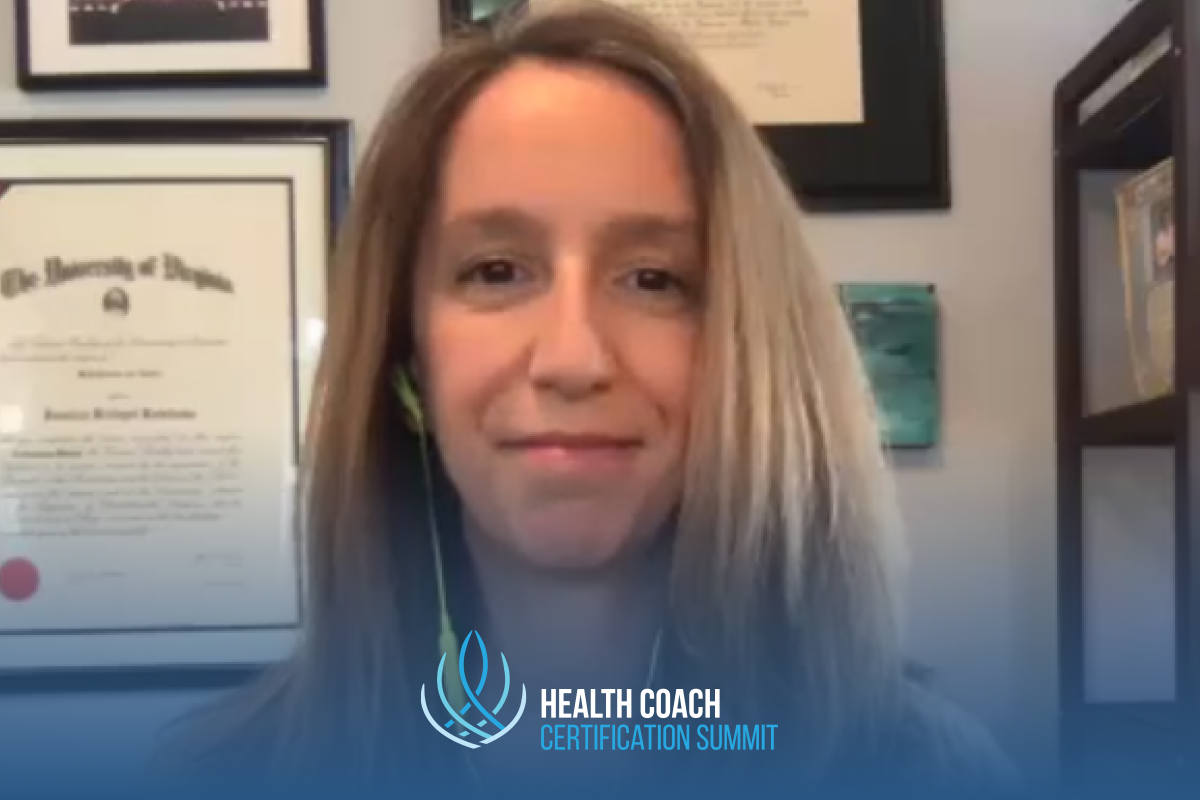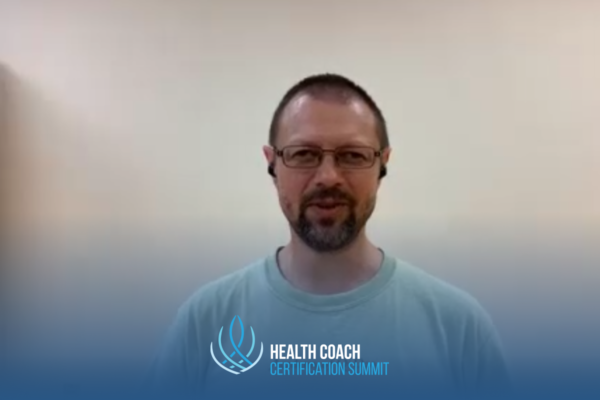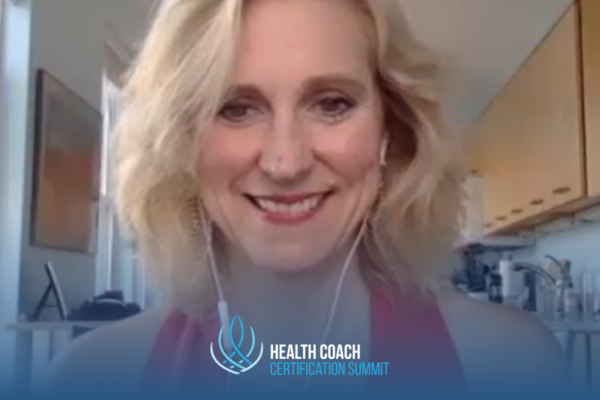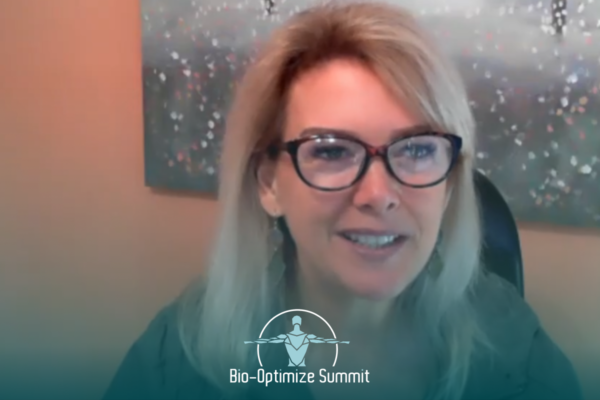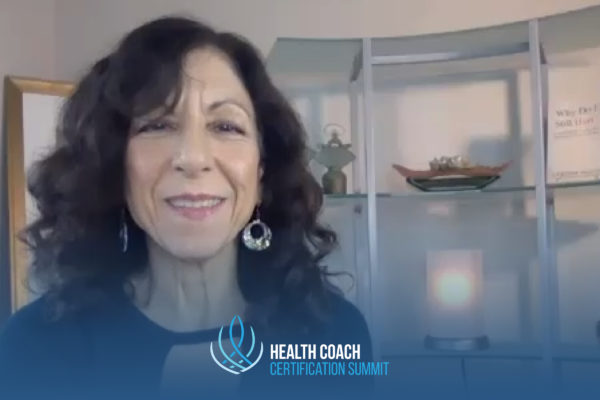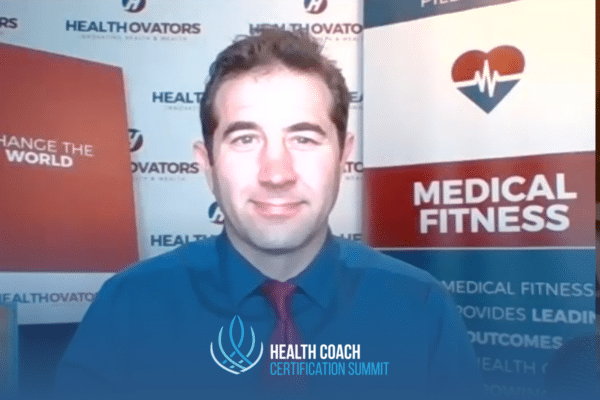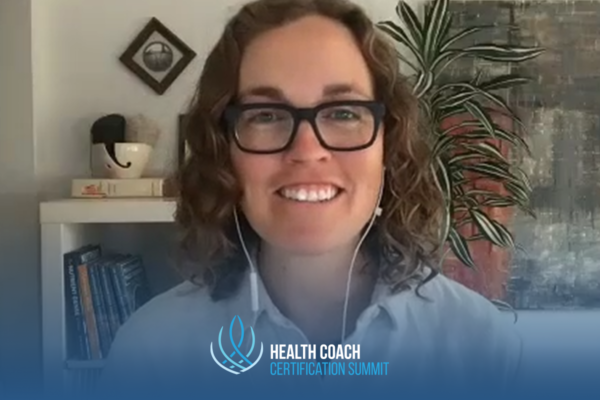Join the discussion below
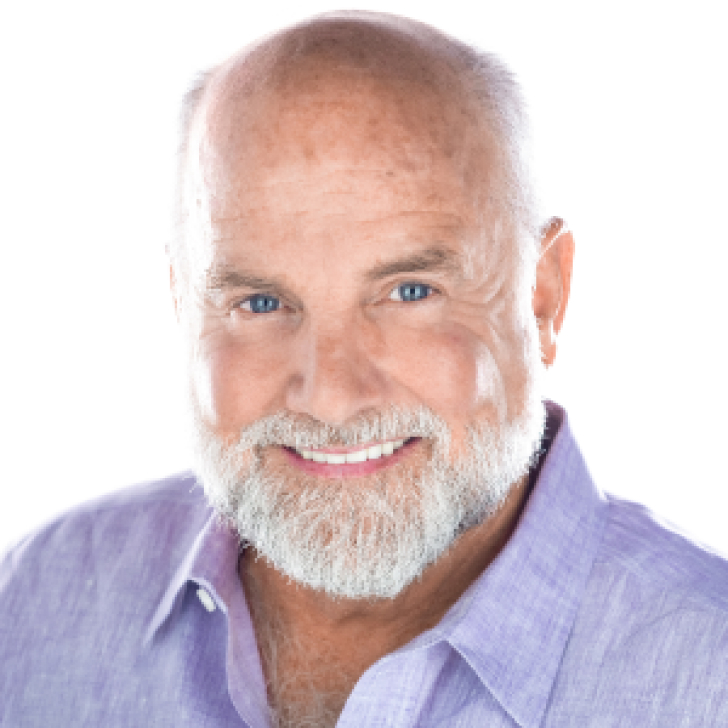
Reed Davis, Triple-Board Certified Holistic Health Practitioner (HHP) and Certified Nutritional Therapist (CNT), is an expert in functional lab testing and holistic lifestyle medicine. He is the Founder of Functional Diagnostic Nutrition® (FDN) and the FDN Certification Course with over 3000 graduates in 50 countries. Reed served as the Health... Read More
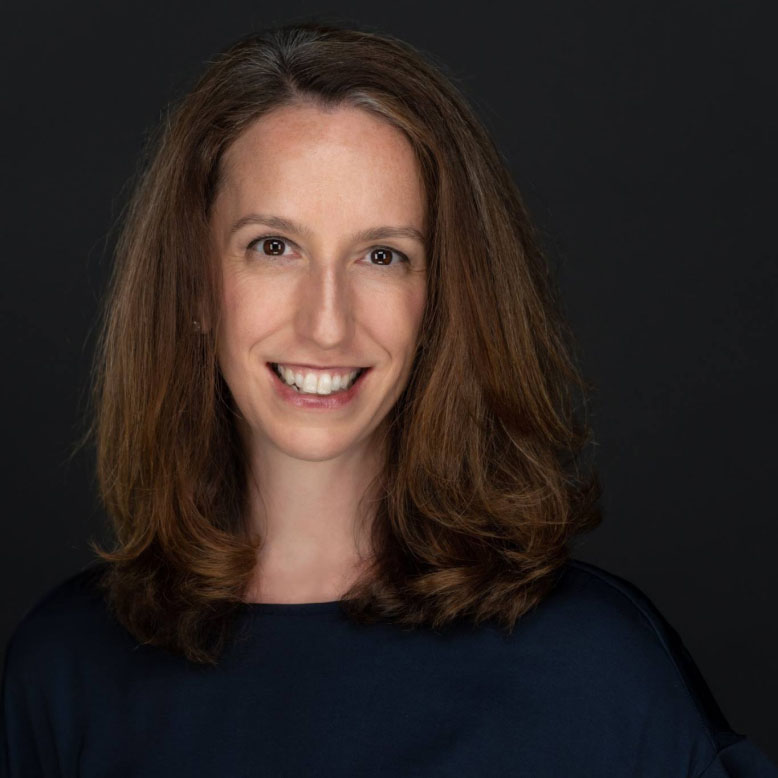
Jessica Drummond, DCN, CNS, PT, NBC-HWC
Dr. Jessica Drummond is the CEO of The Integrative Women’s Health Institute and author of Outsmart Endometriosis. She holds licenses in physical therapy and clinical nutrition and is a board certified health coach. She has 20 years of experience working with women with chronic pelvic pain, facilitates educational programs for... Read More
The Women’s Health Coach Certification is the first and ONLY NBHWC-Approved Online Health Coach Certification Program focused on Women’s Health
It is an 18-month program that can be completed online at your own pace.
The program has been developed by Jessica Drummond, DCN, CNS, PT – a leading women’s health expert with two decades of experience building her own 7-figure practice.
It includes in-depth training material, your own Master Coach, personalized support and plenty of mentoring opportunities to ensure your lifelong success! The four components of the program include, health coaching communication skills, health coaching skills practice and mentorship, functional nutrition and lifestyle medicine education, and business training.
Related Topics
Bones And Hormones, Business Skills, Chronic Pelvic Pain Conditions, Clinical Experience, Coach And Clinician, Digital Marketing, Endometriosis, Female Athletes, Fertility, Functional Medicine, Functional Nutrition Approach, Health Coach, Health Coaching, Integrative Womens Health Institute, Mentorship, Niche Population, Orthopedics And Sports Medicine, Perimenopause, Period Pain, Principles Of Leadership, Specialized Knowledge, Vulvodynia, Womens Health Coach CertificationReed Davis, HHP, FDN-P, CMTA, CNT
Welcome back to the event, everyone. I’m really excited today to have Dr. Jessica Drummond, MPT, CCN, CHC Drummond with us. She’s the CEO of the Integrative Women’s Health Institute and author of Outsmart Endometriosis. Jessica Drummond, MPT, CCN, CHC holds licenses in physical therapy and clinical nutrition and is a board certified health coach. She has 20 years of experience working with women with chronic pelvic pain. She facilitates educational programs for women’s health professionals, more than 60 different countries. And she leads virtual wellness programs for people with endometriosis. Dr. Drummer lives and works with her husband and daughters between Houston, Texas, and Fairfield, Connecticut. You know, you could always tell a smart person, by how short they keep their bios, Jessica Drummond, MPT, CCN, CHC. Because you know, some of them just go on, and on, and on. And I like that, you know, and we’re going to give you every opportunity to express who you are here today and what your message is. So, thanks for being here.
Jessica Drummond, MPT, CCN, CHC
Thanks for having me.
Reed Davis, HHP, FDN-P, CMTA, CNT
Yeah, and, and thanks for not giving me three paragraphs to read. Now I’m sure it’s all gonna come out. Yeah, you and I were talking before we started the recording here and I love the idea of Integrative Women’s Health Institute. You know, we have our health institutes and we have our women’s institutes and integrative women’s health is something that, you don’t have to be a woman to appreciate. I want to tell you, my first demographic was all women when I started in 1999 testing women’s hormones and their bone density. I had a bones and hormones we call it. It was all women. They just seemed much more interested in their health and willing to do the things. So, I’d like you to give us a little bit more about your background please and then we’ll talk about your health coach certification.
Jessica Drummond, MPT, CCN, CHC
Yeah. So, I graduated from physical therapy school back in 1999 and I went to PT school intending to do orthopedics and sports medicine. And I was an athlete as a kid and I did do that for the first few, you know, first my first job and then I pretty quickly began to specialize in sort of the orthopedics of women’s health. So, shoulder pain related to breast cancer surgery or pelvic pain related to pregnancy, things like that. And I became more and more specialized in the world of women’s health. And then I had, my first daughter was born in 2003 and I got sick. I think what happened to me at that point was knowing, you know, I had no idea at the time, but years later and all the other education I’ve had, what I think happened to me was I had a reactivation of Epstein BARR virus. So, I was really fatigued, anxious, got every cold and flu, sinus infection. And I was trying to work in a pretty stressful inpatient rehab job. And, you know, had a little kid and my husband traveled full time for work and it was a very challenging time. And I went to a lot of different doctors at all the big teaching hospitals I was working in and specialty hospitals. And the only real answers they had for me were things like naps or antidepressants, which you know, we’ve all heard, right.
Reed Davis, HHP, FDN-P, CMTA, CNT
Take a nap.
Jessica Drummond, MPT, CCN, CHC
Yeah. And so, obviously that didn’t work very well and that’s how I found functional medicine, you know, sort of years later, of trying to just survive and once and it wasn’t anything extremely complicated. It was really, once I figured out what was going on, a real shift in my relationship to stress, change in my nutrition, change in the intensity of exercise, getting a lot more help, you know, kind of better work life balance and all of these tools were really valuable to my healing. I was probably healthier then in my mid thirties than I ever was. And so, I thought, well let me bring this back to my clinical practice. So, I had to take a couple of years off when I was really sick and I had my young daughter and then I went back to the clinic working in women’s health, public health rehab, and I had my most challenging patient population there were women who struggled with chronic pelvic pain conditions.
And you know, we had tools, but even the really complex medical tools, even the surgeries at the time, medications, all the physical therapy we did, there were a number of people who would hit a plateau and never really had relief, or very good relief. And I realized that this new tool set that I had learned really nutrition, lifestyle medicine, systems biology optimization, would potentially help these patients. So, I tried it. It was very useful and very helpful for a lot of them. And so, eventually I went back to school and did a doctorate in clinical nutrition and published some research on kind of bringing, you know, functional nutrition approach to vulvodynia. And I researched, you know, I did a lot of deep dive into endometriosis. And really from the very beginning of doing this I started sharing the information with my colleagues. And I always took, I kind of was trying to figure out how to learn more in this world, cause that was a long time ago.
That was like, you know, 2009-ish and there wasn’t a lot of training in functional medicine or health coaching. So, I started with kind of learning about health coaching and taking that perspective because they are two different things. Functional nutrition is still sort of a recommendations, right. Clinical recommendations from an integrative approach. And then health coaching is more the behavior change of being able to implement all of that, which is useful for everything health related. So, I started to bring all of that together and the physical medicine that we used in physical therapy and I started to teach my colleagues because I knew that there was no possible way that I would be able to treat every single person with chronic pelvic pain. And I had some mentors who, and people I met even early on, you know like in social media and things like that, who allowed me to come and teach them and help me develop this, what is now the Women’s Health Coach Certification in real time in front of real audiences of clinicians.
And I think that made the program from the very beginning better because I got a lot of real time feedback and was able to iterate it over the course of, you know, I’ve been teaching it since like 2012 now. So, over the course of the last eight years, just getting it stronger and better and more relevant to the practice, not just of women’s health and pelvic pain, but all kinds of things. Fertility, period pain, female athletes, you know, perimenopause, the whole kind of a gamut of women’s health challenges that are very common.
Reed Davis, HHP, FDN-P, CMTA, CNT
Yeah, thank you so much for that. You know, it’s a great background and I love your approach. You know, it’s always been about education and learning at the same time. And that is, tells me that you’re a very open person and that you’re not a know it all. And cause, you know, none of us should be or want to be. And the purposes of this event here is to establish, you know, the principles of leadership and what makes a good health coach. And that openness is always going to be a big part of it. I graduate people every week from, from our program and they want, they always ask, what can I take next? Take a break, you know, and, and go help some people with what, you know, like, like you can’t be the perpetual student.
You got to actually help people too and earn a living, this thing called earning a living So, but you know, you’ve done both and, it’s fantastic. I really appreciate that Dr. Jessica Drummond, MPT, CCN, CHC. So, you know, and the other thing that I noticed is you learned from the people you’re teaching and I’ve asked every one of my graduates, how can I make my course better? Since 2008, every single person I interview as, as their exit, you know, we call it a postgrad interview. What could I do to make the course? But that’s why it’s so damn good and so robust now, is they want me to, you know, it’s like, I get great ideas from the people who, that you teach. So, good. Good on you for that. I think I’m just recognizing that in you cause I, I value it very much. So, why is your health coach certification focused on women’s health?
Jessica Drummond, MPT, CCN, CHC
Well, I mean mostly it was an organic extension of my clinical practice at the time. And so, it was just my area of clinical interest and yet that kind of natural organic expansion. And then at a certain point I realized that it was also a really good idea to be very niched down because, and even what I teach is much broader than what I, I recommend that my students teach and, and work with. Because, you know, at the same time I was learning a lot of principles of digital marketing, which was a lot different again in 2009, 2012 than it is now. But we knew even then that to be able to rise above the noise, that there had to be from a marketing standpoint, you had to be speaking directly to a certain niche population. And I would say that’s just as important, if not more important now.
And what, what works with that, not only from a marketing standpoint why that’s so important to me now that I realize the value in it, is that not only do you do better in marketing, thus you have a more successful practice. And like you said, you know, I don’t want my students to only be taking classes forever. I want them also to get clinical experience, and mentorship, and learn from their patients and clients because that’s the way we really put this into action. And, you know, you can’t do that if you don’t have any marketing or business skills. And then not only that, but I don’t want my students to be just great marketers. I want them also to be great at what they do. And that’s a lot easier to do, the more specialized you become because you can, you know, immerse yourself more in new research, you can listen to other perspectives in that particular niche field. You can go to conferences, you can can, you know, take classes, whatever. You can see more and more, more patients that are relatively similar. So, you can learn from that. And so, I think being niched down makes you, makes your business more successful but also makes you better as a coach and/or a clinician.
Reed Davis, HHP, FDN-P, CMTA, CNT
Fantastic. You know, and I agree with you and it’s not just in the digital age. You know, cause I started in 1999 and 2000, 2001, two, three, four, five, six, seven, eight. For all those years I did a ton of lecturing. Going out to libraries and there was, it wasn’t, the cell phone wasn’t even invented until 2007 I think. So, I had a pager, you know, and then I was just, you know, phoning from the office and, and lining up, making sure my guests were going to be there and bring a friend and the whole thing. Then I would drive up to like 60 minutes away, 90 minutes away, and because they were distance, we kind of pioneered distance coaching then, I’d have to mail them, you know, an inch thick package when we were all, and we’d go over it page by page on the phone with their husband listening on an extension. You know, we didn’t have the Skype and Zoom and, and you know, cell phones and the internet and well there was internet but nothing like it was.
But even then, my point was that even then, I was speaking to mostly women that, you know, back then it was fibromyalgia and chronic fatigue. And you know, you had the endometriosis and those things. Bone density was really huge back then too, you know. So, I get the idea of niching and I think you’re right about that. So, tell us a little bit more about your program. Is it entry level? Do you need to have a women’s health or wellness license of some sort like you have or who can enroll and what are you looking for there?
Jessica Drummond, MPT, CCN, CHC
Yes, it is entry-level. We do have about 60 to 70% of our students, come from either kind of some other women’s health or health background or wellness background. And then we have a lot of people who are career changers as well, who often had some kind of personal experience. You know, they had endometriosis themselves and they didn’t feel like they got everything they needed from their medical journey or you know, they had some other similar, there were perimenopausal symptoms, or period pain symptoms, or things like that. So, the only requirement to begin our program cause it, it is entry-level. And actually it’s interesting, because some people who come with no medical background have an easier time because people with medical background, you know, health coaching is a different skill set than clinical medicine. So, you have to kind of unlearn some things. In some ways it’s, it’s exactly the opposite.
But either way, the only requirement is a, an associate’s degree and you know, a willingness to learn because there is a little bit of, there are pieces of it that have some complex science, but we have a lot of mentoring in our program, which I think is really important. Everyone is assigned to an individual master coach as soon as they start the program. I do live calls twice a month, so there’s a lot of in-person, we have retreats for people at least one weekend a month. So, there’s a lot of in person mentoring, which I think helps people, whether or not they have a strong science background. And as I said, a lot of times people who don’t come directly from healthcare have a little bit of an easier time learning some of the communication skills. But it’s super valuable for the people who come from a healthcare background because it actually takes the stress off of them to start thinking in that coaching mindset, rather than feeling constantly responsible for, you know, having magic wands to fix people that don’t actually exist.
Reed Davis, HHP, FDN-P, CMTA, CNT
Yeah, I get it. So, it’s entry level, but now what are the requirements as far as like technical skills? Do they, obviously we run into this, it’s like you have to know how to use a computer. You know, we just mentioned the technology has changed so much. What kind of a platform isit live classes where you just show up and take notes or is it like where they watch a lot of videos? Or you know, a little bit more about your program on that level.
Jessica Drummond, MPT, CCN, CHC
Yeah, it’s more, it is fully online. So, you definitely have to have some computer literacy and we have our tech team helps people, you know, with password issues and things like that. But it’s self paced. There are some live components, but you can schedule those at, you know, preferred times for you. And so, the training is primarily online in like recorded videos and you know, we have notes and handouts and things like that for people to go through. And then there are zoom calls and virtual recordings. It’s, it’s fully online because we have students all over the world. But, you know, so you have to be, to some extent computer literate. It’s not complicated technology, but it is, you know, it does require some aptitude for technology.
Reed Davis, HHP, FDN-P, CMTA, CNT
Yeah. Yeah. I remember when I couldn’t even spell IBM now no one knows what IBM even is. Anyway. So, now is it, is it a rolling start? Like I could get started today if I wanted? And then, you said self paced. Does that mean I could do it in three months if I’m an eager beaver or is it you have to pace yourself a little more?
Jessica Drummond, MPT, CCN, CHC
Yeah, it is rolling admission. We, you can take up to 18 months to complete the program. Are, you know, eager beaver students tend to finish in closer to six months because of the virtual retreat component that is kind of live in real time. And then the, you know, the average student finishes in about nine to 12 months and you know, some people have babies in the middle or move or whatever and they’ll, they’ll finish in 18 months.
Reed Davis, HHP, FDN-P, CMTA, CNT
Okay. Yeah. Well that’s good. So, when you were doing, your clinical practice, what made you start leaning towards a different skill set? Like the idea of health coaching and functional nutrition. What was missing from your clinical practice? You must’ve felt something was missing or, you know, you wouldn’t have developed this other area.
Jessica Drummond, MPT, CCN, CHC
Yeah, I think it was really that biochemical approach to, you know, having tools for hormone balance initially that was really important. The deeper I got into it, you know, gut healing is so foundational. Endometriosis and vulvodynia from the research that I did and in my doctoral program also I think, have underappreciated immune autoimmune components that are so, I think necessary to address not just, you know, we think of some of these pain conditions as just inflammatory conditions, but really there are immune, autoimmune, digestive function, there are so many layers to it. That as I started to understand this perspective of functional nutrition and I started to recognize the value of health coaching where, you know, as much as I could make recommendations, whether as a physical therapist where I’m giving exercise prescription or as a nutritionist where I’m giving more clinical nutrition recommendations, I can’t go home and eat for people. So, the more I, you know, have health coaching skills, the more that people can implement these changes.
Reed Davis, HHP, FDN-P, CMTA, CNT
Okay. So, what do you, what do you think students like the best about your program? What do you get the most sort of compliments on?
Jessica Drummond, MPT, CCN, CHC
Yeah, they really like our retreats. So, we have these two days, you know, kind of deep dive retreats. They love working with their master coaches, getting real feedback on their own coaching skills so that they get a lot of confidence. And I think they just really like the community because we’re all specialized in women’s health, there’s a lot of community around, you know, helping each other with complex cases. A lot of different perspectives. We have students with a lot of different clinical and nonclinical backgrounds. So, you get a wide variety of perspectives more so than you would get in your traditional healthcare communities where, you know, everyone’s usually coming at it from a very similar perspective.
Reed Davis, HHP, FDN-P, CMTA, CNT
Right. But so how do you, if personal mentorship is so important, and I agree it is and we have it. You know, that’s a major thing that people love about our program too. How do you go about keeping the small school feel? You know, like, cause when you have, when you have thousands of students in 50 countries or whatever, like we do, how do you keep that feel?
Jessica Drummond, MPT, CCN, CHC
Well, we have master coaches. So, over time we keep developing people and then some of our best people we hire and they work with us to be an extension. You know, obviously I can’t mentor every single person personally, but our master coaches do that and they stay really on the pulse of it. They’re also right in there, you know, becoming board certified and they’re still also, they have their own practices or their own work. They do a lot of different diverse jobs, which is really interesting. You know, one of our master coaches works for the state of Connecticut implementing health coaching programs for people who are in underserved populations, and other people work for app based health coaching companies. Others have their own practices, others have clinical and coaching practices that they integrate. So, I get to utilize all of their experience and perspective as well to be an extension of me for more personal mentorship.
Reed Davis, HHP, FDN-P, CMTA, CNT
That’s fantastic. You mentioned that, in your bio that you work with your husband and daughters between Houston, Texas and Fairfield, Connecticut. Well, there’s a fair bit of difference, I would think. Texas and Connecticut. Where do you have the retreats? You have to like, somewhere in the middle or are they in Texas or Connecticut?
Jessica Drummond, MPT, CCN, CHC
No. The retreats are virtual. We do them on Zoom.
Reed Davis, HHP, FDN-P, CMTA, CNT
Oh, okay. Alright. Alright. So, it’s still, you get your credit for live, you know, synchronous training then, right?
Jessica Drummond, MPT, CCN, CHC
Yeah.
Reed Davis, HHP, FDN-P, CMTA, CNT
Okay.
Jessica Drummond, MPT, CCN, CHC
Yeah, so it’s synchronous training, but it’s virtual. Yeah.
Reed Davis, HHP, FDN-P, CMTA, CNT
I got it. I got it. Yeah, that’s, that’s, that’s critical. I’d be interested afterwards to find out what, what platform you’re using for that. We’re doing a lot of it ourselves, but you know, I always want to swap notes with another expert in the field. So, I’ve only got a couple more questions. I want to make sure that you get a chance to say everything you know, meaningful about your program. Like what, I just asked you, what are your students like most, what do you love most about it?
Jessica Drummond, MPT, CCN, CHC
I love most the fact that we’ve been able to impact such a broad and diverse group of practitioners. You know, when I first did this, it was all live, which was great, but it didn’t allow me to, you know, reach the, the wellness studio owner in Northern Italy or you know, someone working in South Africa or people working in small rural towns. And what I like about the virtual platform that we’ve developed over the last several years is that we can reach a wider diversity of clinicians and coaches. We can reach people further geographically, but also different perspectives in terms of they all come with different backgrounds. So, that’s really what I like the best. It’s, it’s so interesting to be building a community that is all, has the same mission, but has a lot of different perspectives that they bring to the table.
Reed Davis, HHP, FDN-P, CMTA, CNT
Yeah, fantastic. It’s remarkable how individualized, even though we’re on, we’re on the same team, you know, the makeup of the group is just remarkably refreshing. I think that the, I don’t like the word diversity, but it really is pretty diverse. Well, are your graduates out there getting interesting jobs. What, what are some of the commonalities you’ve seen there or some of the most interesting things?
Jessica Drummond, MPT, CCN, CHC
Yeah, I think the, there’s lots of different kinds of jobs. So, we have people working in integrative cancer hospitals for example, or for inside of physician’s offices that do for, like naturopathic fertility or functional medicine, fertility. We have students, we have a lot of students who have started their own practices or added new lines of service to their, especially physical therapy practices, acupuncturist practices, things like that. We have, some of my favorite stories are when students in the community like meet during the retreats and then start working together. So, we have a student in Louisiana who came to us as a fitness professional, had a pretty big virtual platform for fitness training. And she met in the program, a woman who was a health coach living in the middle East who specializes in breast cancer explant or breast explant surgery for people who have breast implants taken out. And now they collaborate on a virtual program despite the fact that one lives in the U.S in Louisiana and the other lives in the middle East.
We had two other students, one lives in Germany, one lives in California who came together and put together a wellness retreat for women with pelvic health issues in Morocco. So, it’s really fun for me to see what people come up with as they meet each other in the program. You know, so lots of different kinds of jobs. People working for app based health coaching companies. A lot of people with very specialty practices. In the UK I can think of two, one that focuses on endometriosis, one that focuses on perimenopause. You know, we have a new one developing in bone health as you said, that’s still a necessary topic for sure. Lots working with female athletes and young female athletes, teenagers.
We have one student who, is now totally off the grid. She kind of sold her house. She specializes in female athletes and mentoring graduate students in their own health. Cause of course graduate students are exhausted just like everybody else. And she sold her house. She and her husband now live in an RV and just sort of travel around a lot of kind of digital businesses, which is really fun for the clinicians that were not happy, sort of chained to the hospital, they now have a lot of location freedom, which is pretty cool. So, those are some of off the top of my head that have been really fun for me to hear about.
Reed Davis, HHP, FDN-P, CMTA, CNT
Those are great. Yeah, it’s amazing how many, what’d you call it? Explant? Like the extraction of implants, the breast implants.
Jessica Drummond, MPT, CCN, CHC
Mm-hmm.
Reed Davis, HHP, FDN-P, CMTA, CNT
Those are causing a lot of problems. I’m sure some women are still very happy with their implants but a lot are not. And it’s interesting how that’s become kind of a niche or niche for, for some of our coaches too. It’s remarkable because, you know what, and it goes back to their personal experience. Like, well, here’s what happened to me and I, you know, and like, I was all messed up and then I did this, and this, and this, and you know, got some training and here’s how I can help you. It’s remarkable how rewarding that can be to a person. You know, and I think that’s one of the things I enjoy seeing the most is your, your graduates who are actually going out there and really finding that meaning and purpose in life by helping others. And again, keeping it professional, keeping it like this is what we do for a living, keeping the standards in. Speaking to those standards. I want to kind of wrap up the next couple of questions in the area of the purpose of this event. You know, trying to establish leadership ground rules. What, what do you, besides teaching your course, which I know you’re doing a great job, what else could we be doing as leaders? You know, we’re having summits, we’re in that what do you see as the future for us leaders?
Jessica Drummond, MPT, CCN, CHC
Well, I do think that level of professionalism is very important. That’s why I am very supportive of the NBHWC and you know, supporting any of our students who want to become board certified. We, you know, support that kind of studying for that exam and getting all their ducks in a row throughout the program. I feel like in general it’s also simply about how we teach people to set up their practices. So, right from the get go it’s about, you know, this is a business. You are making a decision to create a professional relationship with your clients and you’re not, you know, this isn’t just a friendly chat. There are clear boundaries that need to be in place. You have to have all your legal and insurance ducks in a row, you know, and if you’re not committed to starting a business, get a job in the field but don’t just wing it. You know, I’m not really about supporting people who just not that I mind this, but it’s not to me about just kind of chatting about healthy recipes on Instagram. You know, it’s more, I think it’s more deep than that.
Otherwise it gets diluted cause people are like, well what is even a health coach? And I think the, the role of a health coach can be so incredibly powerful. If we look at, I read an article, you know, we’re right in the middle of this pandemic and I read an article that only 12% of Americans don’t have a comorbidity that would put them at great risk for complications from coronavirus. Which are basic things like diabetes, hypertension, you know, metabolic syndrome, cardiovascular disease, you know, we have 80, what does that 88% or something like that, that need this kind of baseline lifestyle medicine. So, we should really be a professional field because there’s a vast need for it. And if it’s not treated professionally, then I think the problem with the kind of medicine that health coaches offer is that it’s not seen as powerfully as it really is.
And you know, having a background in Western medicine, the bias is towards doing the most complicated stuff first. Right. And so, you know, and so if we can change that perspective and show the power of lifestyle medicine and especially how well that works when people have support around it, because we know it doesn’t work to just give people a list of here’s healthy foods you should eat, or here’s what time you should go to bed. Like people don’t do that. But when it’s professionally supported, it actually works quite, very well. And I think we really underestimate the power of this kind of medicine, which is absolutely what’s required because we’ve tried the most complicated, most expensive medicine and it’s failed 88% of our population. So, I think that level of professionalism is really important to gain the respect that we need to reach the needs of so many people in the U.S and globally.
Reed Davis, HHP, FDN-P, CMTA, CNT
So, glad to hear you say that and couldn’t agree more on, on the professionalism. And there are, you know, among the things you just mentioned, there are other standard practices if you will, or the things that separate a coach, a professional from say a hobbyist. Things like pricing and things like that. Do you have any comments on that that would be helpful for listeners?
Jessica Drummond, MPT, CCN, CHC
Well, I think consistency in pricing actually, you know, not undervaluing the services. You know, I’ve strongly support cash based practices and my practice has been cash based since 2009. Not because I don’t want people to have access, which I absolutely do, but because I think that there’s a lot of value in people who are making these changes, being, committing the time and their financial resources because it helps them actually execute what they need to do. Making health behavior change takes a lot of effort and it’s, you know, and so if someone is committed financially to the program, they’re just more likely to be successful. And I don’t like to, how I practice to be dictated by insurance company limitations. So, I’m strongly in favor of, of cash practice. I wish that these services were more accessible and I think there is some movement in that. There are now some CPT codes, but perhaps there are even better ways to do that. Such as, you know, the program like my, our master coach facilitates through the state of Connecticut.
So, there are various ways that we could, you know, support having these kinds of lifestyle medicine services be more accessible. And I think there’s more work to do there, but I think for your average person who is making these changes, you know, just kind of being, being committed to their health, from a time standpoint, from a commitment standpoint, from a financial resources standpoint, those people are the ones who have the absolute best outcomes. And it allows professional health coaches to practice without being exhausted and burned out. And I think that’s also really important and super undervalued in traditional healthcare. You know, when I was practicing in hospitals, no one was ever at all cared how healthy I was. And so, when our, you know, when our students start our program, the first thing we do is have them kind of turn the mirror on themselves and have a commitment to their own health, which includes creating boundaries so that they’re served. You’re, they’re priced high enough so that they have the bandwidth to serve the people that they take on without depleting their own health.
Reed Davis, HHP, FDN-P, CMTA, CNT
Fantastic. You know, we could pretty much end it there, you know, along these lines of what, what does it take on a personal level? Cause you have to be a professional. But the idea of walking the talk is critical. It’s the first thing we have people do is, you know, I teach a course in lab work and then natural protocols of course, and you have to do it on yourself. It’s just, that’s a huge part of the program. That’s worth the price of admission right there is if you just only work on yourself. Anything else?The traits of a health coach, like the personal traits of a health coach, that would separate him or her as a professional versus the hobbyist.
Jessica Drummond, MPT, CCN, CHC
Again, I think it’s about boundaries and commitment to professionalism. So commitment to continuing education, commitment to mentorship, commitment to being a mentor, commitment to getting clinical and coaching experience and you know, commitment to learning your, to filling in the gaps in your weaknesses. If you’re having trouble filling your practice, are you dedicating yourself to learning those marketing skills? Are you being niched down enough? Are you committed to helping people solve a specific problem? And are you doing it in such a way that holds the value of the services for your clients and also for yourself? And I think that the people that struggle the most are those who really have trouble, who need to continuously work with their own boundaries. Because again, to create a professional relationship, you have to be clear about what that means. You know, you wouldn’t just text your gynecologist at, you know, three in the afternoon and expect them to get right back to you. You know? So, I think health coaches should see themselves in the same exact way to be able to have as powerful an effect.
Reed Davis, HHP, FDN-P, CMTA, CNT
Gosh, let’s just, um, leave it with those encouraging words for all the people out there who might be considering upping their game. You know, if you’re already a health coach, if you’re in the related field, if you’re what we call an allied practitioner, it sounds like your course would really fill in a lot of pieces of the puzzle that they’re missing so they can help women more, help that demographic more. Also, that, you know, you bring a real sense of professionalism. Exactly what we’re looking for in this event is the health coaching certification programs where you can make a really good living doing what you love to do. And you mentioned a really critical thing in a stress free practice. Like don’t over promise but over deliver, you know, and things like that. Really critical that I know, I know you believe in foundationally, Jessica Drummond, MPT, CCN, CHC. What’s your best personal health tip? Something that you do on a daily or regular basis that, just so we can know you a little bit better and we’ll finish with that sneak question.
Jessica Drummond, MPT, CCN, CHC
Yeah. So my, the one thing that I do every single day is I get up in the morning and I do 15 minutes of Ziva meditation. That’s just the kind of meditation practice. So, that I think is the key to being able to be as productive as I am on any given day. So, 15 minutes of meditation, ideally twice a day, but once a day is not negotiable.
Reed Davis, HHP, FDN-P, CMTA, CNT
Fantastic. That’s, that’s remarkable and you really are setting the example Dr. Jessica Drummond, MPT, CCN, CHC. So, thanks again for being here and I want to just ask the listeners to go ahead and purchase the, the opportunity in the show notes we have information on Jessica Drummond, MPT, CCN, CHC, but we also have information on how you can just own all of these recordings of these amazing certification program leaders. And so, I want to encourage you to go do that now while they’re still available. Cause after awhile they won’t be available anymore and you’ll have missed out. So, please go do
Downloads
